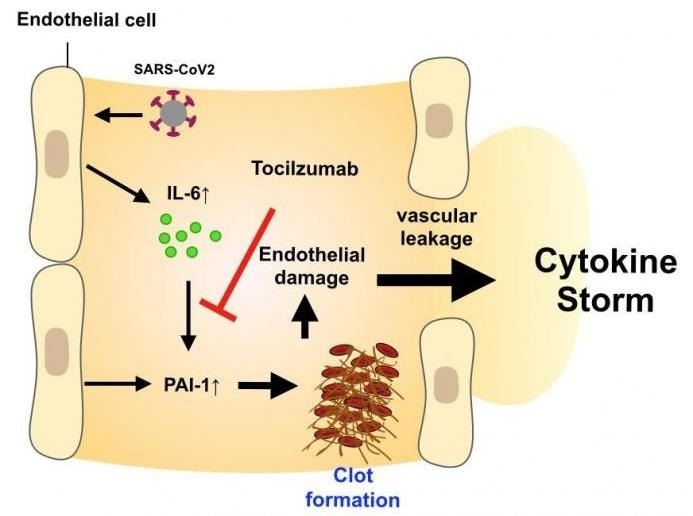Globally, countries are competing to design a novel vaccine for SARS-CoV-2—the virus responsible for causing the current COVID-19 infection. As such, scientists are trying to figure out how this virus leads to a range of symptoms that appear to persist long after the active viral infection.

IL-6 in blood promotes thrombus formation via PAI-1. By suppressing IL-6, Actemra® reduces the severity of pneumonia caused by the cytokine storm. Image Credit: Osaka University.
Headed by Osaka University, the researchers discovered an effective treatment for the lethal over-activation of the inflammatory response observed in several patients affected by the severe COVID-19 infection.
The study was published in the Proceedings of the National Academy of Sciences.
Cytokines are essentially a cluster of tiny proteins that can either block or improve the response of the human immune system to trauma, infection, and diseases, like cancer. One major role of these proteins is to activate inflammation, which triggers the healing process.
However, overstimulation of the inflammatory response also has a range of harmful complications, spanning from severe autoimmune diseases to asthma.
Cytokine release syndrome (CRS) is one such complication that is observed in patients suffering from a hyperimmune response to trauma or microbial infection and can result in the failure of multiple organs and even death.
Despite knowing which cytokines are involved, there is still no specific immunotherapy for CRS and treatment is limited to supportive care. To better understand the molecular mechanisms of CRS pathogenesis, we first studied the cytokine profiles of 91 patients diagnosed with CRS associated with bacterial sepsis, acute respiratory distress syndrome, or burns.”
Sujin Kang, Study Lead Author, Osaka University
Interestingly, the researchers observed that patients from all three groups had increased levels of proinflammatory cytokines IL-6, IL-10, IL-8, and MCP-10, and also a protein known as PAI-1, which leads to tiny blood clots in vessels throughout the body, such as the lungs.
Most significantly, elevated levels of PAI-1 are linked to more severe cases of pneumonia, which is regarded as a common cause of death among patients affected by the COVID-19 infection.
Since the IL-6 proinflammatory cytokine was positively linked to the levels of PAI-1as well as the other cytokines, the team concluded that IL-6 signaling is essential for the development of CRS after trauma or infection, and may have a vital role to play in the pathogenesis of the COVID-19 infection.
Examination of cytokine profiles in severe COVID-19 patients revealed an increase in IL-6 early in the disease process, causing release of PAI-1 from blood vessels. Interestingly, PAI-1 levels were significantly higher in COVID-19 patients with severe respiratory impediment.”
Tadamitsu Kishimoto, Study Senior Author, Osaka University
But most importantly, when patients with severe COVID-19 infection were treated with Actemra®—a human monoclonal antibody-based drug that inhibits IL-6 signaling, PAI-1 levels quickly decreased and severe disease symptoms were also reduced.
Therefore, the inhibition of IL-6 signaling could prove useful for treating CRS as well as the severe respiratory complications of the COVID-19 infection.
Source:
Journal reference:
Kang, S., et al. (2020) IL-6 trans-signaling induces plasminogen activator inhibitor-1 from vascular endothelial cells in cytokine release syndrome. Proceedings of the National Academy of Sciences. doi.org/10.1073/pnas.2010229117.